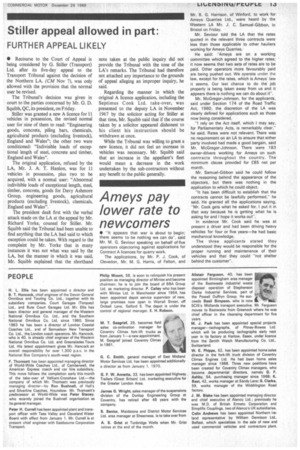Stiller appeal allowed in part:
Page 15

If you've noticed an error in this article please click here to report it so we can fix it.
FURTHER APPEAL LIKELY
• Recourse to the Court of Appeal is being considered by G. Stiller (Transport) Ltd. after its five-day appeal to the Transport Tribunal against the decision of the Northern LA. (CM Nov 7), was only allowed with the provision that the normal user be revised.
The Tribunal's decision was given in court to the parties concerned by Mr. G. D. Squibb, QC, its president, on Friday.
Stiller was granted a new A licence for 11 vehicles in possession, the revised normal user for nine of them to read: "Engineering goods, concrete, piling bars, chemicals. agricultural products (excluding livestock), England and Wales"; the other two were conditioned: "Indivisible loads of exceptional length of steel, concrete and timber, England and Wales".
The original application, refused by the LA, Mr. J. A. T. Hanlon, was for 11 vehicles in possession, plus two to be acquired, with a normal user: "Abnormal indivisible loads of exceptional length, steel, timber, concrete, goods for Davy Ashmore Group, engineering goods, agricultural products (excluding livestock), chemicals, England and Wales".
The president dealt first with the verbal attack made on the LA at the appeal by Mr. Richard Yorke, counsel for Stiller. Mr. Squibb said the Tribunal had been unable to find anything that the LA had said to which exception could be taken. With regard to the complaint by Mr. Yorke that in many instances it was not what was said by the LA, but the manner in which it was said, Mr. Squibb explained that the shorthand note taken at the public inquiry did not provide the Tribunal with the tone of the LA's remarks. The Tribunal had therefore not attached any importance to the grounds of appeal alleging an improper inquiry, he said.
Regarding the manner in which the original A licence application, including the Septimus Cook Ltd. take-over, was presented to the deputy LA in November 1967 by the solicitor acting for Stiller at that time, Mr. Squibb said that if the course taken by a solicitor appeared dishonest to his client his instruction should be withdrawn at once.
While the Tribunal was willing to grant a new licence, it did not feel an increase in vehicles was necessary. Mr. Squibb said that an increase in the appellant's fleet would mean a decrease in the work undertaken by the sub-contractors without any benefit to the public generally.












































































